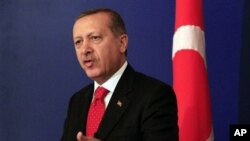The U.S. has been quietly ratcheting up economic and financial pressure on Iran amid signs that talks about Tehran's suspect nuclear program could resume next month. But this push, along with sanctions from the EU and United Nations, could cause some diplomatic friction for Turkey which opposes Iranian sanctions.
When German President Christian Wulff addressed the Turkish parliament this week he appealed for Turkey to support sanctions against its neighbor Iran.
He asked Ankara to support the U.N.'s push for tighter restrictions against Iran, and said it was now up to Tehran to take action and ease the international community's concerns.
Turkey voted against the latest round of U.N. Security Council sanctions. It has since said it will enforce those measures, but not the more stringent sanctions introduced by the European Union and the United States.
Selim Yenel is the spokesman for the Turkish foreign ministry:
"We feel that we are only bound by U.N. sanctions, because we don't believe sanctions work and we want to keep Iran at the negotiating table and nobody discussed these unilateral sanctions by the U.S. and the EU we don't feel obliged to abide by them," said Selim Yenel.
In fact since the trade-based sanctions by the U.S. and EU were introduced, the Turkish government has made improving trade with Iran a priority.
Last month in Istanbul, the two countries committed themselves to tripling trade volumes from $14 billion to $42 billion.
But international relations expert Soli Ozel of Istanbul's Kadir Has University says it's more posturing than substance. He argues Turkish companies are quite aware that they would face penalties either in the U.S. or Europe if they broke their sanctions.
"I mean no, company that has extensive business in the U.S. is going to do it," said Soli Ozel. "Is is not as if the Turkish government is ordering companies to do business with Iran. All its saying is I must have my own autonomous room, and companies that have no interest in the U.S. may be interested but that is limited as well."
According to a western intelligence source, however, there is growing concern that Turkey, with its highly developed financial sector and, in particular its state banks, could be used by Iran to circumvent sanctions and purchase equipment for its nuclear program.
Mellat, Iran's second largest bank, which has been blacklisted by both the EU and U.S. under their new sanctions, continues to have offices in three Turkish cities. According to observers there is no visible evidence that the bank is facing any restrictions by Turkish authorities.
In August, a high level U.S. government delegation visited Turkey and cautioned companies against breaking Washington's sanctions. Only this month, the Turkish foreign minister Ahmet Davutoglu re-iterated his country's commitment to Iran.
Iran is an important neighbor to us and we have significant commercial and energy ties, he says. Their unilateral decisions are not legally binding.
This week, U.S. Treasury Under Secretary for Terrorism and Financial Intelligence , Stuart Levey, held fresh talks with both Turkish government officials and private financial companies over its sanctions policy. Foreign ministry spokesman Yenel says they are aware of the risks but says the United States has no jurisdiction over Turkey
"Well we hope that it won't come to that," he said. "Definitely, we will look very carefully on what is going to entail those who are in business with Iran. But we feel that we are only bound by U.N. sanctions."
Emre Yigit chief economist of Turkish trading house Global Securities says the increasingly tough stance by the EU and U.S. is unrealistic.
"Iran was is and will remain a neighbor of Turkey it's bit like telling France that for some reason you should not import anything from Germany, or the United Kingdom that should stop with the rest of the European Union," said Emre Yigit. "This is not necessarily going to happen."
Unlike EU members, Turkey's economy is enjoying record growth. Much of that success is due to the country diversifying its trade away from its traditional trading partners in Europe and turning towards its neighbors in the Middle East. With Iran increasingly isolated, the potential for trade is considerable, but so is the risk that Ankara will end up on a collision course with both the U.S. and EU.
Iran Sanctions Pose Diplomatic Conundrum for Turkey
- By Dorian Jones




